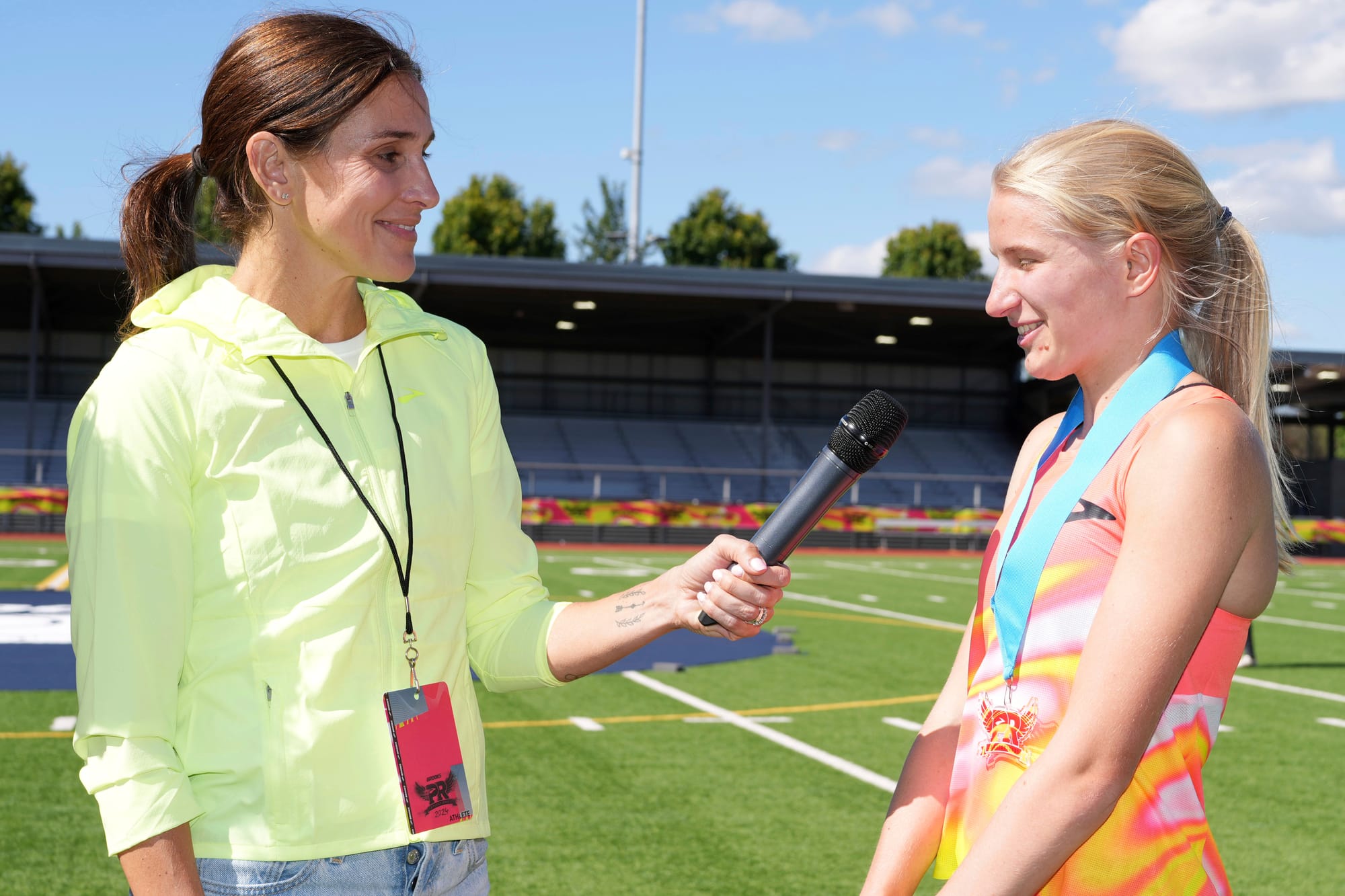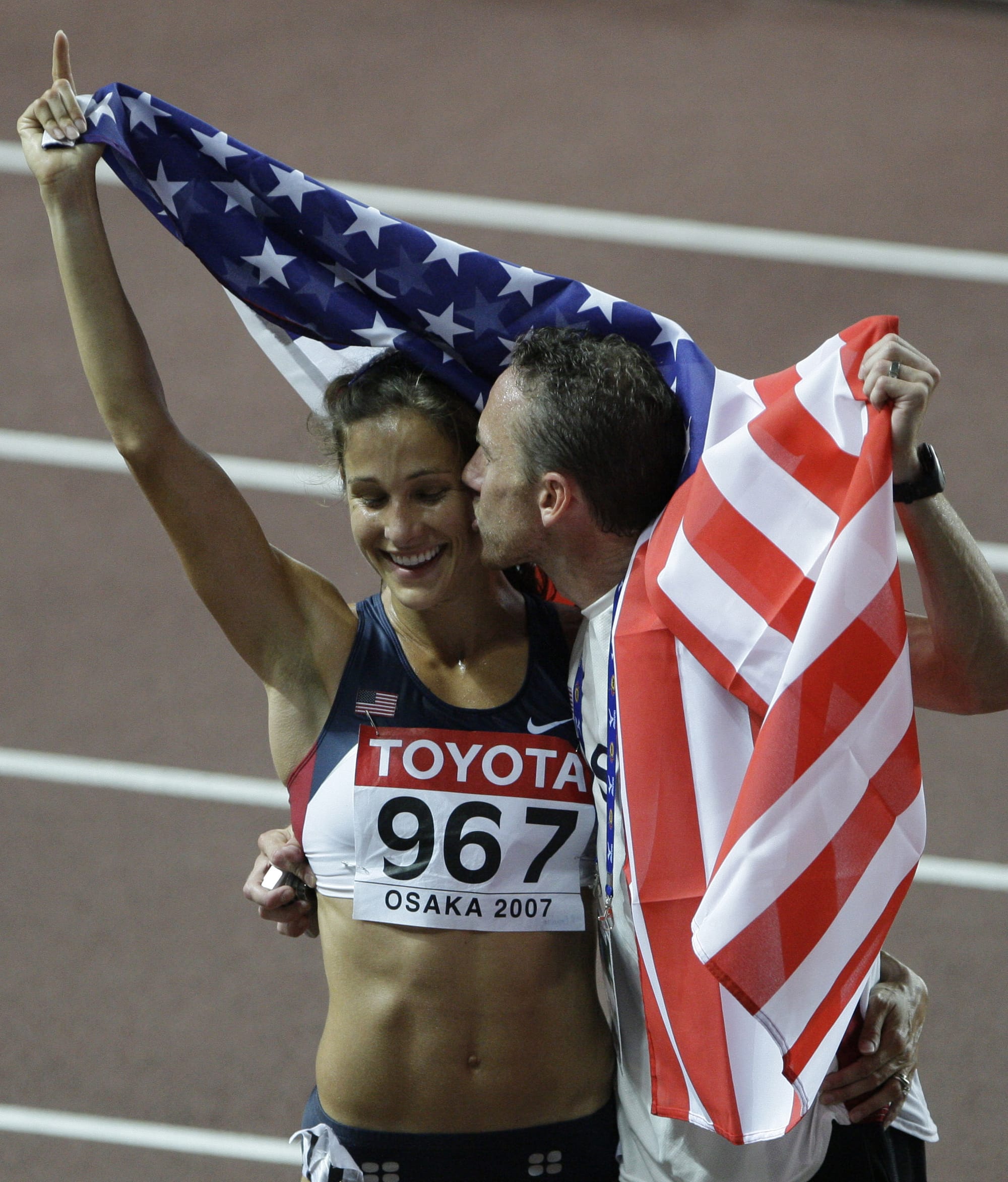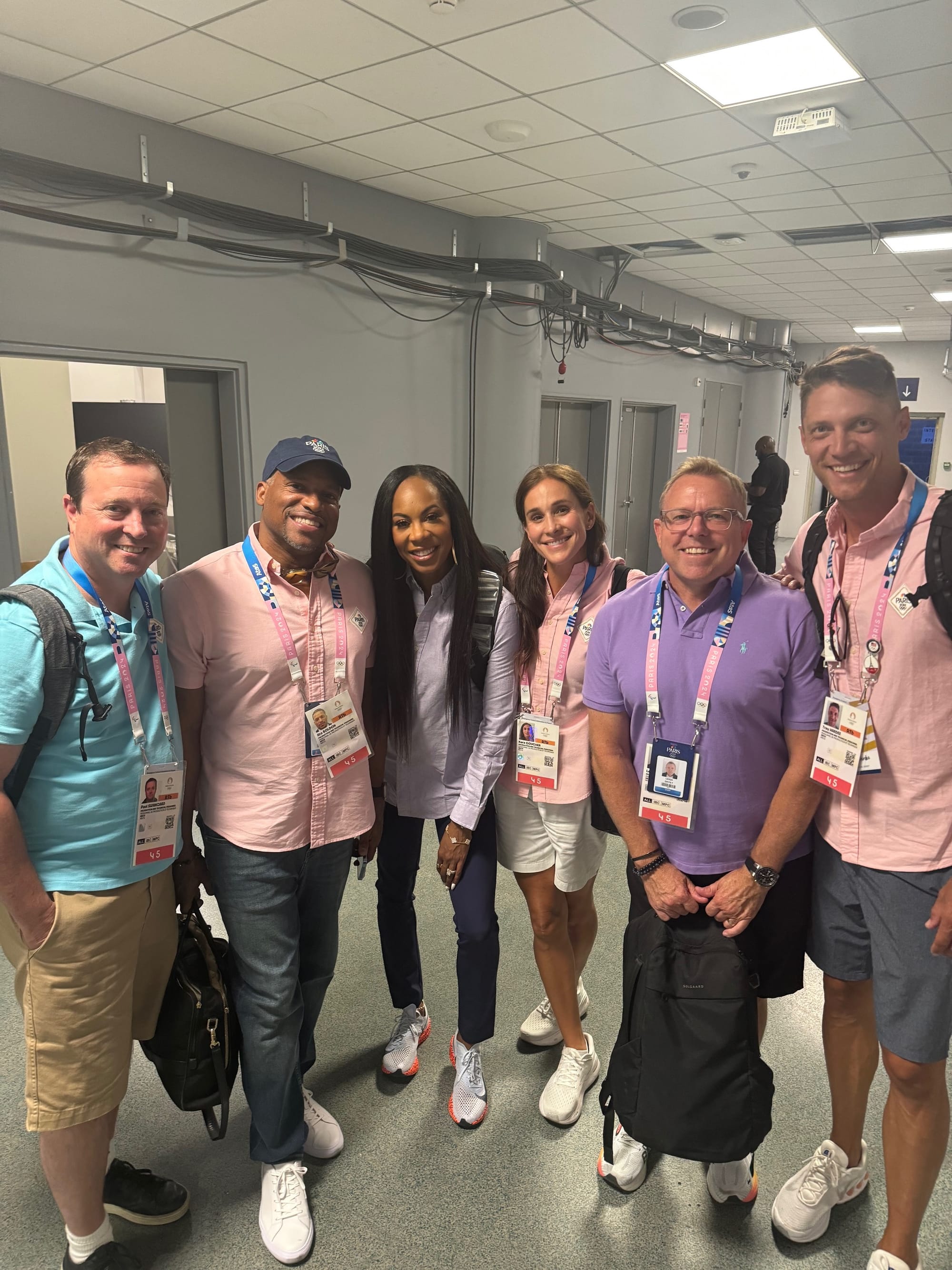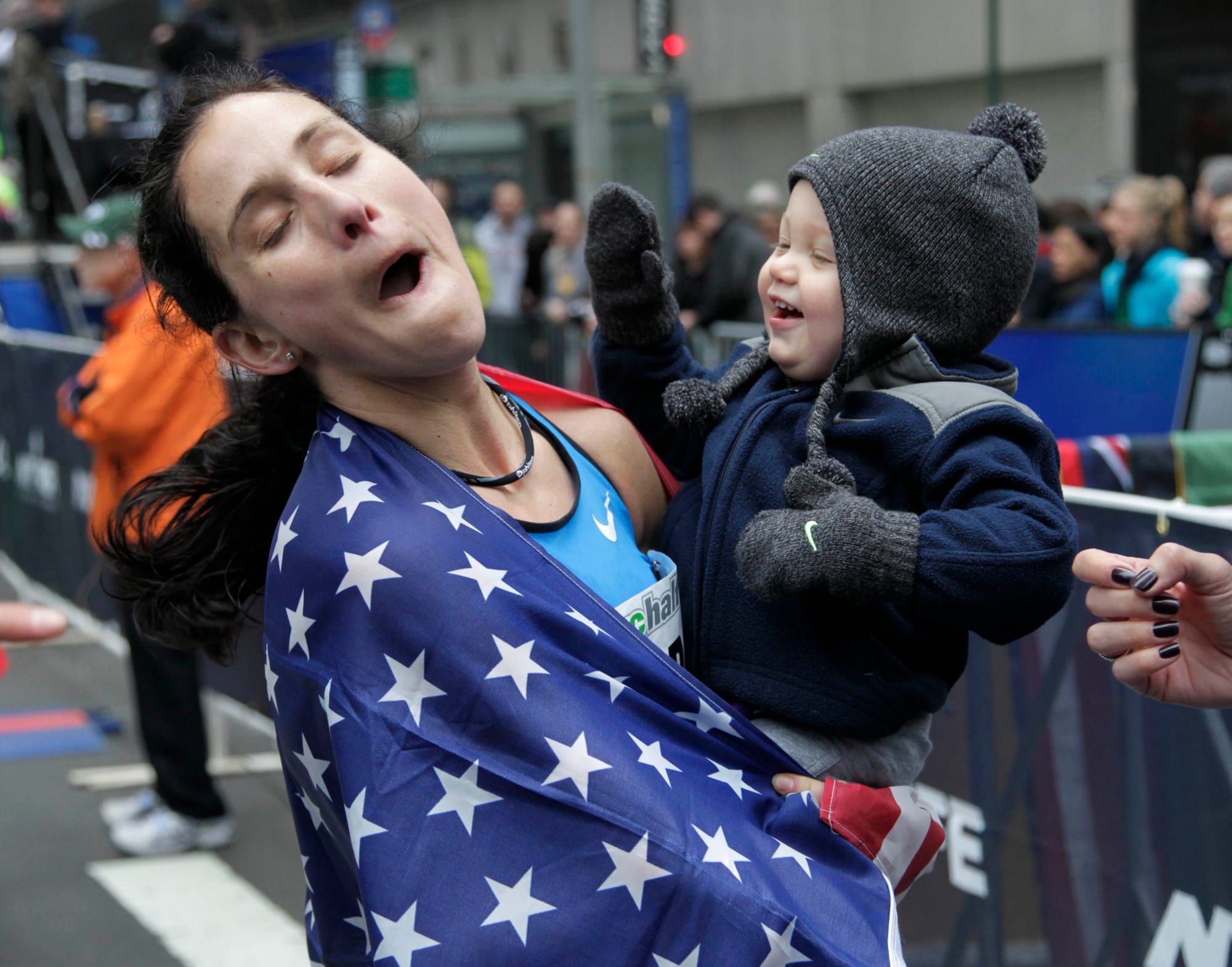Five laps remain in the men’s 5,000-meter Olympic finals in Paris, and America’s best shot for a medal, Grant Fisher, is in sixth position.
Alongside play-by-play announcer Leigh Diffey in the NBC booth, Kara Goucher keeps an eye on Fisher while crash-coursing viewers on both the craft of distance racing and the competitive dynamic between 21 runners and Norway’s Jakob Ingebrigtsen, comfortable in fifth.
“When will he make his move?” says Goucher, herself an Olympic veteran of the 5,000. “He doesn’t have to force it like you have to in the 1,500. He has speed that they don’t have.”
This final mile and a quarter only takes about five minutes, and her voice mirrors the do-or-die inflections on the track, where a pair of Ethiopian runners hold first and second, and Fisher fights for position after slipping back to eighth.
“He got pushed back, he’s not going to let that happen again, he needs to protect that. We see Ingebrigtsen moving past Grant Fisher, everyone’s waiting for him to strike. … They have less than a kilometer to go now. Ingebrigtsen is just planning this. He will go and be ready to go, and everyone is waiting. … They know a big kick and a big move is about to be made.”
Indeed, Ethiopian Hagos Gebrhiwet surges from seventh and ahead of his two teammates, opening a wide gap from the rest of the field with just a minute to go. Fisher is in a distant ninth.
“Grant Fisher needs to stay calm and close that gap. Ingebrigtsen is going after Gebrhiwet. … He’s looking around, he’s looking up at the screen, he’s gathering information for when he wants to strike. … Look at the ease of this move! He is so calm, cool and collected, this is the event he was born to run!”
He coasts to a seemingly effortless lead and gold-medal finish a full 1.38 seconds ahead of silver medalist Ronald Kwemoi and 1.47 ahead of bronze medalist … Grant Fisher, who’d cranked his dial in the final 100 meters to win his second bronze of the Games.
“What a meet for Grant Fisher! He proved tonight he is not a fluke, he is here and he is here to stay! This will mean so much for distance running back home and proves that U.S. distance running belongs on this stage!”
In the days after the Games, her social feeds were packed with positive comments and appreciation for her expertise and passion. Yeah, there were a couple haters, anonymous of course, on a runners’ forum saying things like “emotional” and curiously, “the excitement level in her voice stays at an elevated pitch.”
Here’s the thing: She uses her voice in ways her younger self might not have imagined.
She grew up a “very shy” kid in Duluth, Minnesota, where she and her mother and siblings moved from New York after her father was killed by a drunk driver days before her fourth birthday. They landed with her maternal grandparents until they got a house of their own.

It was her grandfather, a lifelong recreational runner, who introduced her to the sport. She was his little running partner, a way to be active and spend time together. He took her to her first race when she was six years old, and she fell right at the start. In the moment, her grandfather worried he’d ruined running for her, but she picked herself up and finished the race with a ferocity that stuck.
“He was so excited to see I had this competitive part of my personality that no one knew about.”
It came to be a defining trait. If her results spoke for themselves over the years, they also seemed to work against her at times. She remembers how she wasn’t picked to play the lead in The Nutcracker, or her stepbrother commenting about how competitive she was playing a game of Clue. “I didn’t like that. I didn’t want to be that person. So stuff like that would eat at me,” she says.
As she got older, she began to embrace that person. She joined a running team in seventh grade, watched American Lynn Jennings bronze in the 1992 Olympic 10,000-meter event, and realized there was a whole other stratosphere of competition. That became the dream.
Then, once she got to the University of Colorado, she began to see earning potential, too. The pro contracts landed by program alums planted a seed, and for that seed to bear financial fruit, she needed to win a national title.
In 2000, she earned not one NCAA title but three: the 6,000-meter cross-country championship plus the 3,000- and 5,000-meter outdoor track championships. She left CU a five-time All-American in track and two-time All-American in cross country.
A pro career seemed closer than ever.
But injury set her back, making her wonder if she should call it a career. Being around her now-husband Adam, a fellow CU runner who made the 2000 Olympic team, kept her dream close.

“If I wasn’t married to him, I probably would have quit. But then every time I thought about quitting, I was like, I know I haven’t run my best yet. So I’d train again. But there were four years of injuries and really doubting myself, questioning my choices.”
Then 2004 brought what seemed like a stellar opportunity: signing with the Nike Oregon Project and running for its storied coach, Alberto Salazar. Kara would be the first and only woman on the team at the time, joining Adam and other men in a quest to replenish U.S. distance running after the drought since Salazar’s back-to-back-to-back New York City Marathon wins in the early ’80s.
Much of Goucher’s time in Oregon was stellar. Backed by highly specialized training, coaching and science, she ran well, finishing second in the 10,000 at the 2006 World Championships and, finally, making the 2008 Olympic team for both the 5,000- and 10,000-meter races. At the time, her ninth- and tenth-place finishes devastated her — she and her coaches had higher expectations.
But she rebounded later that year with an American course record and third-place finish at the New York City Marathon — a mind-boggling finish given it was her first-ever marathon. The following year, she placed third in the Boston Marathon and won the Chicago Half Marathon, and went on to finish fifth in the 2011 Boston Marathon and 11th at the 2012 London Games marathon.
Behind those scenes, though, life with the Oregon Project and Salazar had grown steadily isolating, uncomfortable and, at times, dark.

There was pressure to take suspicious medications and supplements. There were jokes about women’s weight and bodies, including her own body after giving birth. And then there were the sports massages that went far too far and transgressed into sexual assault.
Goucher and her husband left the Oregon Project in 2011, and multiple authorities caught up with Salazar years later.
In 2019, the U.S. Anti-Doping Agency announced a four-year ban on Salazar for “orchestrating and facilitating prohibited doping conduct” as a coach or consultant for the Oregon Project.
Two years later, the U.S. Center for SafeSport permanently banned Salazar from coaching American track and field athletes because of sexual misconduct. At the time, no victims were named. That changed last year when Goucher documented the abuse in her book, The Longest Race, and gave interview after interview following its release.
She’s been using her voice ever since.
At first, she wanted to put the dark experiences aside, but doing so would have meant putting aside the good memories too — the medals, the personal bests, the effort. Time and therapy helped her regain her footing.

Calling races helped, too. Her NBC Sports debut came in 2021 when she helped announce the Olympic Trials for track and field, and then the Tokyo Games too — an experience she says brought significant healing.
“I saw athletes who didn’t make the final, and they’d poured everything into it. I thought, why am I so hard on myself? I’m impressed by them and I’m holding myself to this standard of, ‘I only got ninth.’ I appreciate what I did. I was dealing with a lot outside of the training and was in an unhealthy environment, and I survived it.”
And while nothing replicates the thrill of hearing the bell or digging deep in the final stretch, she still gets a rush out of watching and announcing races.
“I was never the fastest, but I spent so many years behind the leader and learned how to read people’s moves and their strengths, and I could apply that. Now that I’m so removed as a competitor, I can see the wonder again. When I was in my career, I was so fixated on 'How do I win.' I’d lost a little joy and wonder. I’ve been so happy to get that back.”
Her voice is now her profession, but it’s more than that. Whether she’s announcing or sharing on Instagram or talking with fellow Olympian Des Linden on their podcast “Nobody Asked Us with Des & Kara,” Goucher is willing to share.

She talks about her pro contracts that incentivized running on injuries, which led to compensatory injuries: “You should know these things because your goal is to have a long career, and so maybe this up-front money isn’t best.”
She talks about her dad’s death: “We often hear ‘don’t drink and drive’ but I hope that the next time you think about driving under the influence you think about my dad. Take that Lyft, Uber, taxi, call that friend, walk. My dad should be here today. He is not a statistic to me, he is a lifetime of memories and moments stolen.”
She talks about the hard work, highs and lows of elite running, and how she came to appreciate her own journey. For that, Goucher credits her 14-year-old son Colt. He was the one who convinced her, 15 years after her first Games, that she should get a tattoo of the Olympic rings. That she earned them.
“He’s proud of me and what I’ve accomplished. He’s been a huge part of the healing, too, seeing it through his eyes. I feel really lucky to be where I am.”